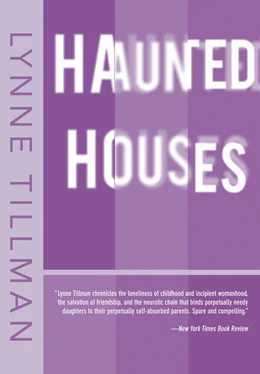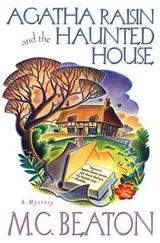Lynne Tillman - Haunted Houses
Здесь есть возможность читать онлайн «Lynne Tillman - Haunted Houses» весь текст электронной книги совершенно бесплатно (целиком полную версию без сокращений). В некоторых случаях можно слушать аудио, скачать через торрент в формате fb2 и присутствует краткое содержание. Год выпуска: 2011, Издательство: Red Lemonade, Жанр: Современная проза, на английском языке. Описание произведения, (предисловие) а так же отзывы посетителей доступны на портале библиотеки ЛибКат.
- Название:Haunted Houses
- Автор:
- Издательство:Red Lemonade
- Жанр:
- Год:2011
- ISBN:нет данных
- Рейтинг книги:5 / 5. Голосов: 1
-
Избранное:Добавить в избранное
- Отзывы:
-
Ваша оценка:
- 100
- 1
- 2
- 3
- 4
- 5
Haunted Houses: краткое содержание, описание и аннотация
Предлагаем к чтению аннотацию, описание, краткое содержание или предисловие (зависит от того, что написал сам автор книги «Haunted Houses»). Если вы не нашли необходимую информацию о книге — напишите в комментариях, мы постараемся отыскать её.
, Tillman wries of the past within the present, and of the inescapability of private memory and public history. A caustic account of how America makes and unmakes a young woman.
Haunted Houses — читать онлайн бесплатно полную книгу (весь текст) целиком
Ниже представлен текст книги, разбитый по страницам. Система сохранения места последней прочитанной страницы, позволяет с удобством читать онлайн бесплатно книгу «Haunted Houses», без необходимости каждый раз заново искать на чём Вы остановились. Поставьте закладку, и сможете в любой момент перейти на страницу, на которой закончили чтение.
Интервал:
Закладка:
Lynne Tillman
Haunted Houses
To Iris Tillman Hill
We are all haunted houses.
— H.D., in Tribute to FreudPart I
Chapter 1
Her father liked to scare her. He knew she adored him. He’d creep into her room early in the morning or late at night and jump on her and she’d cry. He’d console her with kisses and hugs. Years later Jane would say, It’s a hard habit to break. Loving madmen. Jane’s parents, particularly her father, had wanted a son, having two girls already, and had waited nearly seven years before making the unsuccessful attempt to have him. Jane’s mother would need an operation after Jane’s birth, which would put an end once and for all to her childbearing days, but Jane was innocent of this fact, as well as their desire for a son. Otherwise she was not a difficult birth.
At two she had tried to claim her father as her own, covering his face with her little body, and shouting, He’s my daddy, my daddy, to her much older sisters, who could dismiss that kind of behavior as babyish. But Jane was driven. She became Daddy’s girl to the chagrin of her mother, who had her hands full anyway. The third child is always the easiest, she heard her mother say to a woman who was visiting. It’s like she’s raising herself.
Jane’s first boyfriend, when she was three, was a morose, skinny kid who lived on the floor below, his whole family skinny and very pale. After a pretend marriage that lasted a year, they were separated because her family moved away to the suburbs, and she asked one of her sisters if this meant they were divorced. Yes, she answered, and Jane promptly found a second boyfriend, Jimmy, who lived on the next block. He, too, was a peculiar boy, three years older than Jane, and elusive; she could never tell if he liked her or not. Jane couldn’t figure out who her parents liked either, though her father said he liked everybody. In any case he was nice to everybody and they didn’t see him when he was sulking in the basement because he couldn’t hook up the speaker to the radio. He put a telephone down there, ostensibly to call his mother, who didn’t get along with Jane’s mother, and he called her every day.
When she played with Jimmy, Jane insisted upon wearing dresses. He’s too wild, her mother told her. But his nostrils flare when he speaks, she responded, which meant to Jane that Jimmy was sensitive, like a rabbit. She could even tell him about the children’s book she loved and hated because it confused her. There was a little girl who had a blanket. The blanket got a hole in it. She wanted to get rid of the hole so she decided to cut it out. She cut it out and the hole got bigger. She cut that out too, and the hole got bigger. Eventually the hole disappeared but so did the blanket. The little girl cried and Jane was genuinely puzzled.
An unspoken contract existed between Jane and her father; she went along to ball games and amusement parks when other fathers brought their sons. She played seriously with their sons, stretching across the slippery iron horse, reaching for the brass ring, though she was afraid of heights, reaching for it as if she really cared about winning. She hated losing her balance. Jane was almost certain that her father was her partner in this charade, and that he knew she was humoring him. But his moods changed as fast as she changed TV channels. He’d always been violent and had used his belt on Jane when she was small, but these violations were more than balanced by his good looks and charm. Her violations were almost invisible, something about the way she answered a question, something about the way she walked into a room. Everyone was in love with her father, Jane thought. He was so young-looking that her oldest sister’s friends thought he looked more like her sister’s date than her father.
He liked to read to his daughters. And he, more often than her mother, put Jane to bed at night. Occasionally he recited Churchill’s memorable speech about blood, sweat, and tears, or read the Gettysburg Address, or cited the George Medal, which George VI had instituted for commoners, like her and him, to commend them for “obscure heroism in squalid places.” But while he had read Shakespeare to her sisters, he chose for her Lord Chesterfield’s Letters to His Son . Lord Chesterfield wrote many long and logical letters to his profligate son, who should have been in England, not France, of the great harm that would come to him should he continue gambling and whoring. These letters, like Churchill’s speech, were supposed to comfort Jane, who had trouble sleeping at night, but as she was only eight when Chesterfield was read to her, she was not yet thinking of leaving home, or gambling, or whoring, or of being a whore, and unlike Chesterfield’s son, she barely even had an allowance. These letters were harbingers of some future time and didn’t comfort her. At their best they did put her to sleep. Jane never told her father not to read these letters to her. He might sulk or go into a rage. She became an Anglophile anyway.
Watching her oldest sister’s boyfriends come and go, Jane acted like a lady-in-waiting to her — getting her brush, finding her bag, studying her image in the mirror. When her sister put on makeup, it looked to Jane as if she were preparing for a part in a play. There was a solemnness pervading the bathroom, mixed in with smells from the older girl’s lipstick and powder and perfume with which she anointed herself. Glowing with artifice and anxiety, Jane’s sister walked down the stairs, viewed by Jane at the top, lying fat on her stomach so that the boyfriend might not see. Then they disappeared, her sister and her date, both actors in another world.
By the time Jimmy announced that he loved her, or rather her shadow, which she knew meant her, the fact that they were in different grades meant more to her than having won the attenuated battle for his affections. He was eleven and not as skinny as he’d once been, and even though his nostrils still quivered, he just wasn’t as cute, she thought, so she pretended not to understand what he was saying, which was, she discovered early, a disguise that worked.
Besides, she had fallen in love with Michael, another bad boy from good people who couldn’t control him, or that’s what Jane’s mother said. She usually added, He’ll grow out of it, as if his character were a pair of pants. With Jane, Michael stole useless things from Woolworth’s. She stole the tops of Dixie cups for him and watched with pleasure — a small smile on an otherwise impassive face — when Michael ripped birthday party decorations off basement walls. Jane never gave parties and hated basements, where they were always held. Her family’s basement was used by her mother to do the laundry, her middle sister, to practice ballet, and by her father, less specifically. It had a ballet barre, a Ping-Pong table, and bookshelves in which her father kept paperbacks like How to Live with Your Anxiety and hardcovers about Winston Churchill and Abraham Lincoln. One Lincoln book had a picture of all the accomplices to his assassination, hanging on the gallows. Five wore trousers, and one, a dress. Their heads were covered with white bags. She stared at the image for long periods of time in the almost empty recreation room, the room itself weird joke to Jane, whose sense of humor was grim. Watching the conclusion of A Farewell to Arms on television with her mother, she said, flatly, He should get an erector set. Her mother laughed, despite herself, said nothing, and worried about Jane’s strange ideas.
As Jane grew up her father’s alarm at what he called her wild ways also grew. The way she washed dishes. The way she flipped electric switches. It was all wild. Her parents fought over her too. During one fight Jane’s mother took all Jane’s father’s clothes and threw them on the floor. Jane observed the action from her place at the top of the stairs, this time not lying flat on her stomach but seated as if in the balcony of the U.N. At school Jane was considered something of a diplomat, but not by her father, who didn’t move out as her mother said she wanted him to do. Jane wrote in her diary: Now that I’ve seen this, life is different. Life is not that different, she discovered, when Jimmy, reappeared with another neighborhood girl and Jane thought she was in love with him all over again. She thought that showed maturity — to be able to be in love with someone for so long.
Читать дальшеИнтервал:
Закладка:
Похожие книги на «Haunted Houses»
Представляем Вашему вниманию похожие книги на «Haunted Houses» списком для выбора. Мы отобрали схожую по названию и смыслу литературу в надежде предоставить читателям больше вариантов отыскать новые, интересные, ещё непрочитанные произведения.
Обсуждение, отзывы о книге «Haunted Houses» и просто собственные мнения читателей. Оставьте ваши комментарии, напишите, что Вы думаете о произведении, его смысле или главных героях. Укажите что конкретно понравилось, а что нет, и почему Вы так считаете.












